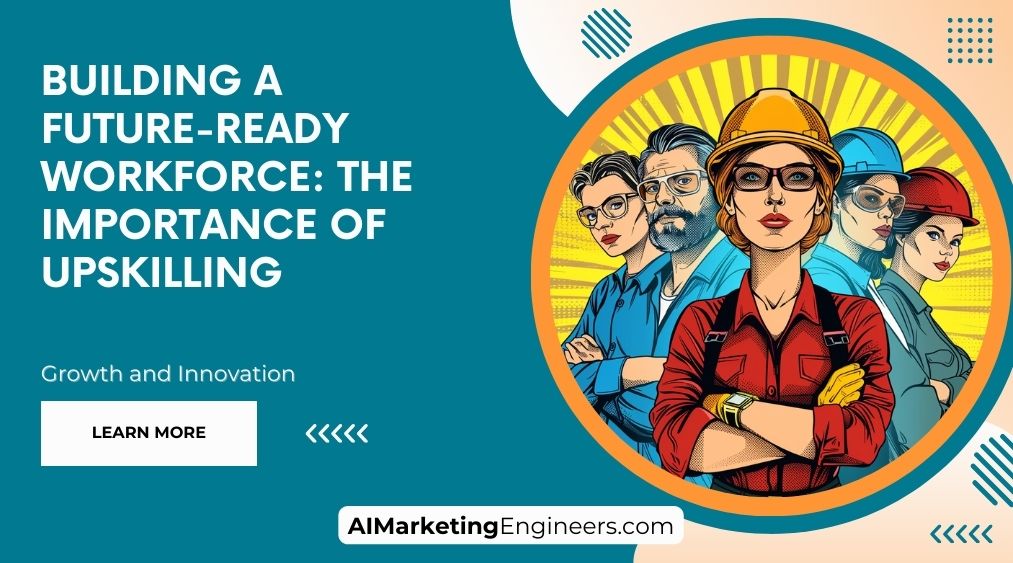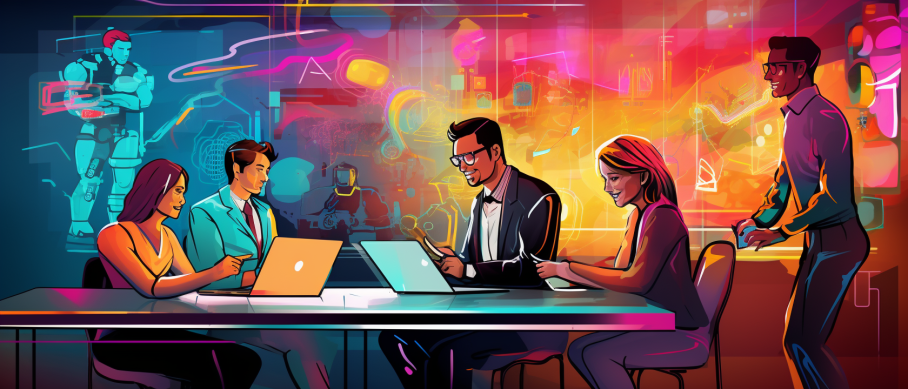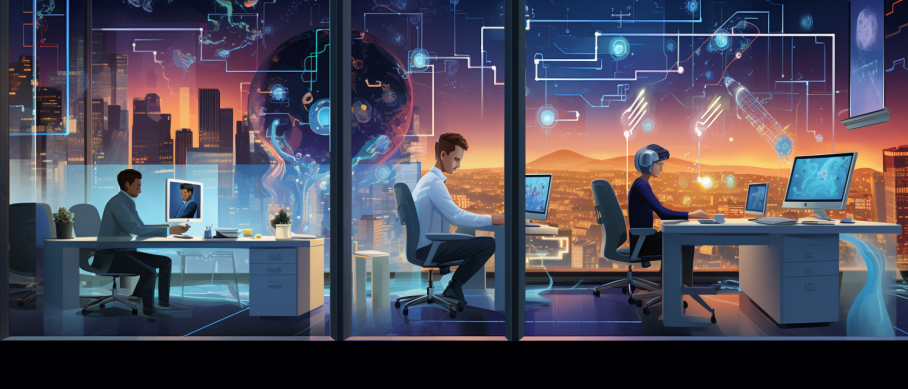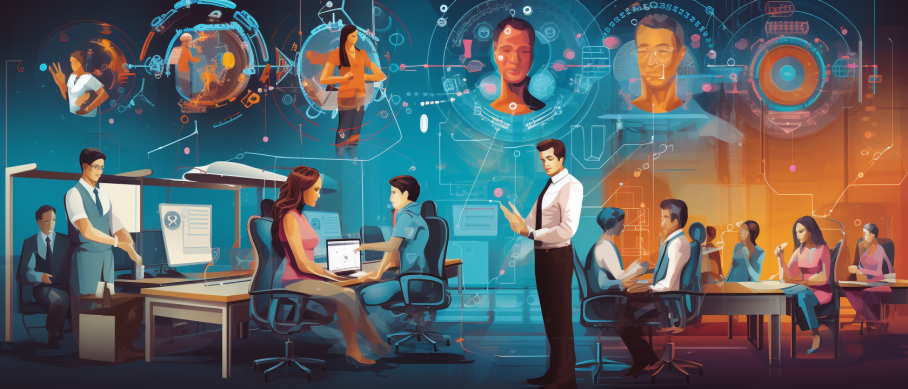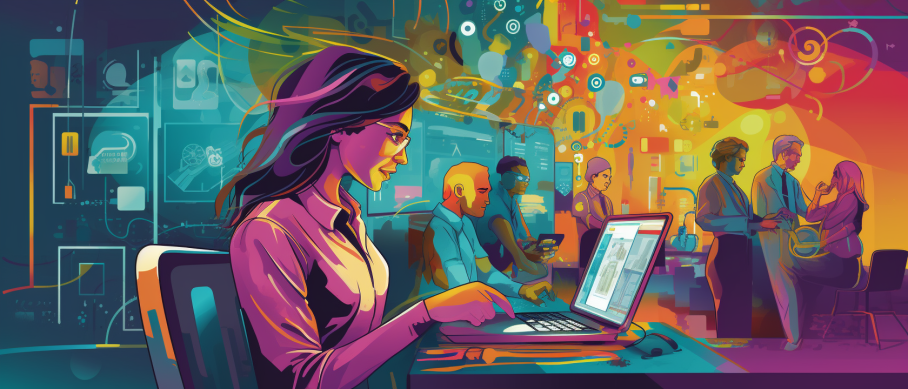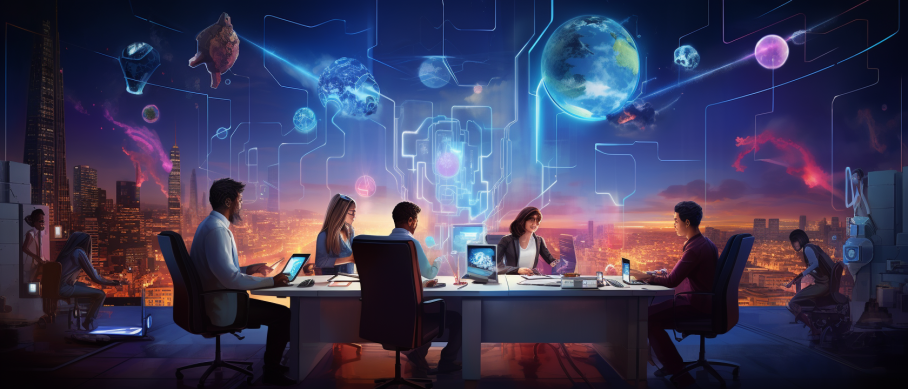Key Takeaways
✅ Upskilling Promotes Skill Agility and Adaptability: Upskilling is not just a buzzword; it's a survival strategy in today's fast-paced market. With technology evolving at breakneck speeds, employees need to adapt quickly. Studies show that companies focusing on upskilling are more likely to outpace their competition. By embracing continuous learning, businesses can ensure their workforce is agile, adaptable, and ready to meet future challenges head-on.
✅ Upskilling Enhances Employee Retention and Productivity: The link between upskilling and employee retention is stronger than ever. Research indicates that employees are 42% more likely to stay with a company that invests in their professional development. Moreover, upskilled employees exhibit heightened productivity, directly impacting the company's bottom line through enhanced efficiency and performance.
✅ Upskilling Supports Business Growth and Competitiveness: In a landscape where 75% of organizations report skill gaps, upskilling emerges as a cornerstone for growth and competitiveness. By closing these gaps, companies not only prime themselves for immediate advancement but also invest in the long-term prosperity of their workforce and business at large. Upskilling equips teams to innovate and drive customer satisfaction, propelling the businesses to new heights.
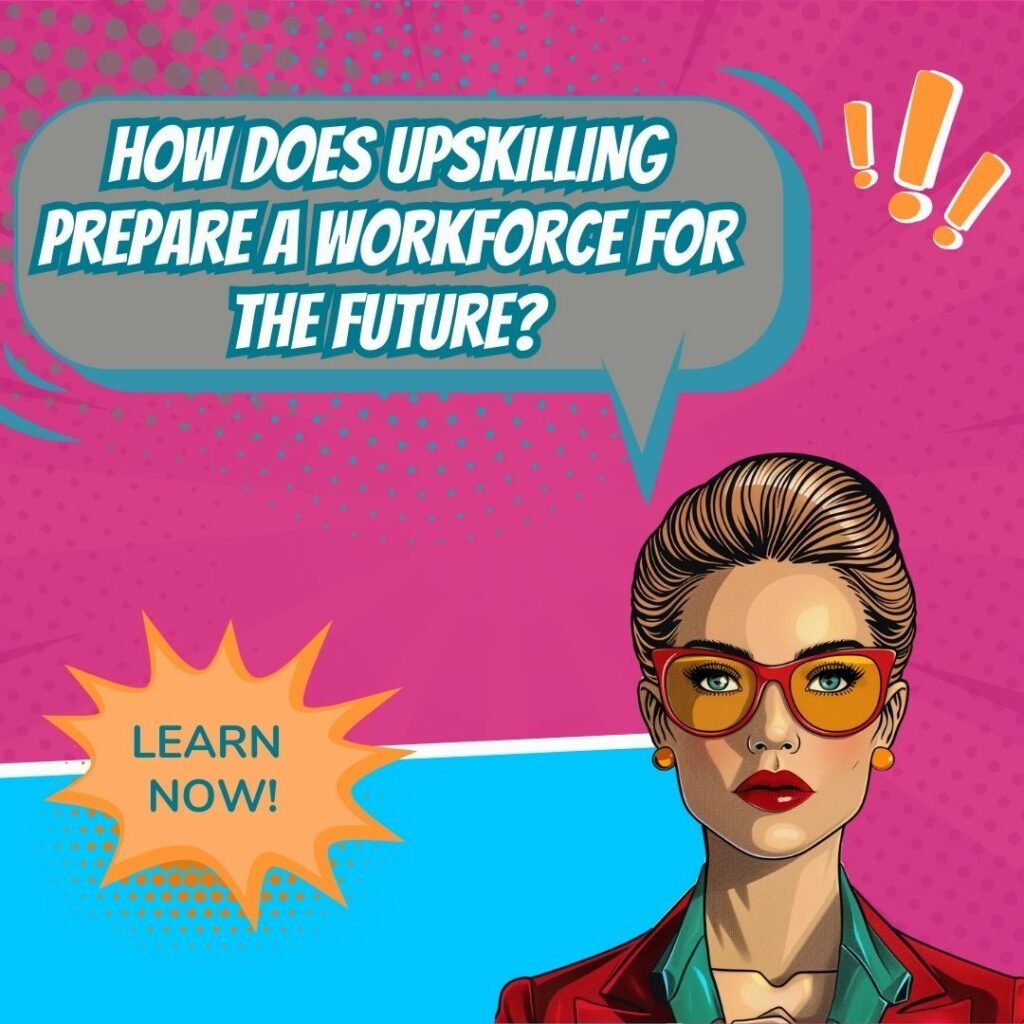 Introduction
Introduction
How prepared is your workforce for the future? In the current business environment, marked by constant changes and technological breakthroughs, the importance of building a future-ready workforce cannot be overstated. The shift toward upskilling has become a pivotal response to the challenges and opportunities presented by the Fourth Industrial Revolution—an era where the fusion of digital, biological, and physical innovations reshapes the global economy.
At the heart of this transformation is the undeniable truth: businesses that prioritize workforce upskilling are setting the stage for unparalleled success. Factors such as technological advancements, escalating global competition, and evolving customer needs are compelling employers to rethink their strategies. Upskilling is not just about staying in the game; it's about changing the rules.
By reading further, you unlock insider insights into crafting a robust upskilling strategy. You'll discover modern perspectives, trends, and solutions that don't just aim to amplify your revenue, ROAS, or ROI but redefine them. Prepare to explore actionable insights and ground-breaking information that will redefine how you perceive workforce development. This is your roadmap to not just surviving but thriving in the future of work.
Top Statistics
| Statistic | Insight |
|---|---|
| Only 26% of CEOs have a future-ready strategy that is holistically focused on changing how, why, and where we work. | This low percentage underscores a significant opportunity for growth in strategic planning among leaders across industries. |
| 31% of workers are confident their skills will be relevant in five years. | A startling figure that highlights the urgent need for continuous upskilling initiatives among the workforce to stay competitive. |
| 93% of companies have leadership support for Diversity, Equity, and Inclusion (DE&I) initiatives. | This high percentage represents a positive trend towards creating more inclusive workplaces, crucial for a diverse and innovative future-ready workforce. |
| Many companies are dropping requirements for a Bachelor's degree, instead focusing on skills-based hiring. | Signifies a significant shift towards valuing practical skills and abilities over formal education, aligning more closely with the current job market demands. |
| Companies and workers who are willing to upgrade their skills continuously are more likely to thrive. | This insight affirms the critical importance of lifelong learning as a key component of both personal growth and organizational success. |
The Necessity of Upskilling in Today's Workforce
As the landscape of business shifts beneath our feet, the push for professional workforce upskilling has never been more crucial. Today's job market is a restless ocean, influenced by technology's ceaseless march, global competition tightening its grip, and customer demands evolving at breakneck speeds. Upskilling, or the art of enhancing one's abilities to stay competitive, isn't just a nice-to-have; it's a necessity. But what's driving this sudden urge to pump new skills into the workforce? Advances in technology, new job requirements, and a shift towards service-oriented models are just the tip of the iceberg. Without upskilling, businesses risk falling behind as new tools and methods become standard. It's not just about keeping up; it's about leading the charge in a rapidly changing environment.
Upskilling Versus Reskilling: Key Differences
It's easy to blur the lines between upskilling and reskilling, but the distinction is quite straightforward. Upskilling is about giving an employee's current skill set a facelift—teaching them the latest methods or technologies related to their role. On the flip side, reskilling is akin to a career pivot, preparing employees for entirely different roles because their current ones are becoming or have become obsolete. It's the difference between teaching a fish to swim faster and teaching it to climb trees because the ocean is slowly drying up. Both approaches are essential in today’s workforce, but they serve different purposes. Understanding which strategy to apply can make or break a company’s adaptability in the marketplace.
Benefits of Upskilling Employees
The benefits of upskilling are many and varied. Firstly, it cultivates skill agility, enabling employees to duck and weave through the punches of market changes. Younger generations, who often prioritize personal growth opportunities over stability, are drawn to companies that invest in learning and development. Upskilling also boosts employee retention, as workers feel more competent and confident in their roles. Productivity sees an upward trend when employees are adept at new tools and methods, leading to a stronger bottom line for the company through reduced turnover costs and enhanced competitive advantage. Additionally, a well-upskilled workforce can drive innovation and improve overall business performance. Investing in upskilling demonstrates a commitment to employees, fostering loyalty and job satisfaction.
The Impact of the Fourth Industrial Revolution
The fourth industrial revolution, marked by the synergy between humans and machines, is reshaping the job market in profound ways. Artificial intelligence and automation are not just buzzwords but realities that are displacing jobs and, at the same time, creating new ones. By 2025, we could see 85 million jobs vanish, replaced by 97 million new roles birthed from this new dynamic. This transformation underscores the importance of upskilling and reskilling initiatives to bridge the gap between the workforce of yesterday and the needs of tomorrow. Companies that fail to adapt risk being left behind in a highly competitive landscape. Embracing these changes can open up new opportunities for growth and innovation. Preparing employees for these shifts ensures a smooth transition and long-term success.
Implementing Effective Upskilling Programs
For companies to navigate the choppy waters of the modern economy, a steadfast commitment to upskilling and reskilling is non-negotiable. These initiatives should be woven into the fabric of a company's strategic goals, making life-long learning accessible, available, and affordable. But it's not a journey companies should walk alone. Education ecosystems must evolve in tandem with industry demands, ensuring a pipeline of talent that's ready for the challenges and opportunities of the future. Partnering with educational institutions can enhance the relevance and quality of training programs. Leveraging online learning platforms can make upskilling more flexible and scalable. Continuous assessment and feedback can help fine-tune these programs to better meet employee needs.
Future-Proofing Your Workforce
Mixing upskilling with reskilling is akin to preparing for all seasons—it ensures that employees remain relevant and productive in an ever-changing world. By equipping workers with a broad and adaptable skill set, companies can secure a significant competitive edge. This not only leads to better outcomes and lower turnover rates but also fortifies the workforce against the unpredictable shifts of the global market. In essence, future-proofing your workforce is not just about surviving the next industrial revolution; it's about thriving in it. By fostering a culture of continuous learning, companies can stay ahead of the curve. This proactive approach to workforce development can drive sustained business success. Investing in the future capabilities of employees ensures long-term resilience and growth.
AI Marketing Engineers Recommendation
Recommendation 1: Invest in Data Analytics and Digital Literacy Programs: In today's rapidly evolving business landscape, data analytics and digital literacy have become indispensable. The World Economic Forum reports that 50% of all employees will need reskilling by 2025, underscoring the urgency of prioritizing these skills. By investing in comprehensive data analytics and digital literacy programs, companies can empower their workforce to stay ahead of technology curves and make informed decisions based on data-driven insights. These programs are not merely about keeping pace with technological advancements; they are about gaining a competitive edge in the digital age. Upskilling employees in these critical areas can enhance productivity, drive innovation, and ensure the company's long-term success in an increasingly digital world.
Recommendation 2: Implement AI-Based Learning Platforms for Personalized Upskilling: To maximize the effectiveness of upskilling efforts, businesses should implement AI-based learning platforms that offer personalized learning experiences. Current trends indicate that such platforms, which tailor learning paths to accommodate individual paces and preferences, significantly enhance upskilling outcomes. By assessing an employee's existing knowledge base and identifying specific skills gaps, AI-powered platforms can recommend targeted learning modules that address these gaps efficiently. This strategic approach ensures that each team member receives the most relevant training, thereby maximizing the return on investment in employee development. Personalized upskilling not only boosts individual performance but also contributes to the overall growth and adaptability of the organization.
Recommendation 3: Create Internal Mentorship Programs for Knowledge Sharing: While formal training programs are essential, the value of peer-to-peer learning through internal mentorship cannot be overstated. Establishing mentorship programs within the company encourages a culture of knowledge sharing, where experienced employees guide and support their less experienced colleagues. This approach not only strengthens team bonds but also accelerates the upskilling process by providing practical, real-time learning opportunities. Pairing seasoned professionals with eager learners fosters mentor-mentee relationships that are instrumental in developing new skills and enhancing job performance. Furthermore, internal mentorship programs demonstrate the company's commitment to employee growth, potentially increasing job satisfaction and retention rates. By leveraging the expertise within the organization, companies can create a dynamic learning environment that promotes continuous improvement and collective success.
Conclusion
In the whirlwind of today’s job market, the concept of upskilling stands out as a beacon of innovation and adaptation. As we unpacked the layers of why upskilling matters, the differences between upskilling and reskilling, and the undeniable benefits it brings to both employees and employers, one thing is clear: to navigate the rapidly changing landscape of the business world, there’s a pressing need to invest in building a future-ready workforce.
The drive behind this necessity is as diverse as it is compelling—ranging from the blistering pace at which technology advances to the global shifts in market demands and job roles heralded by the Fourth Industrial Revolution. This era doesn’t just signal a change; it heralds a transformation that is as intimidating as it is exhilarating, prompting a pivot towards lifelong learning to bridge the gap between current skills and emerging demands.
The impact of this pivot isn’t just theoretical. With 97 million new roles predicted to emerge by 2025, juxtaposed against the displacement of 85 million jobs, the writing is on the wall: the tidal wave of change is upon us, and the only way to ride it is through continuous skill development. Upskilling does more than just prepare individuals for the future; it cements a company’s place in it by enhancing productivity, attracting talent, and bolstering retention.
But, how do we embark on this upskilling journey? It’s about making lifelong learning accessible, aligning education ecosystems with the needs of the industry, and embracing upskilling as a core strategic goal. As daunting as it may sound, the blueprint for future-proofing our workforce is clear. It’s about commitment—commitment to developing a resilient, adaptable, and innovative workforce primed to meet the challenges of tomorrow head-on.
FAQs
Question 1: What is a future-ready workforce?
Answer: A future-ready workforce means having a team that's ready to tackle changing times head-on. They're quick to adapt, and they've got the skills to keep the business moving forward, no matter what comes their way.
Question 2: Why is upskilling important?
Answer: We're living in fast-moving times, right? Upskilling keeps everyone in the know, making sure the team's not just keeping up but also setting the pace. It's all about keeping jobs interesting, keeping folks around, and making sure the business is hitting its goals.
Question 3: What are future-ready skills?
Answer: Think of it like your superhero toolkit. You've got your tech powers—like knowing your way around cybersecurity, crunching numbers with data analysis, and getting creative with AI. Then there’s your strategic smarts—like planning your next big move, understanding what customers really want, and getting stuff done efficiently. And don’t forget your human intelligence—being a people person, thinking on your feet, and adapting to whatever comes your way.
Question 4: How does Industry 4.0 impact the workforce?
Answer: It's like the workplace is getting a major upgrade, turning everything smarter and more connected. This means there's a huge need for everyone to level up their skills. By 2025, half of us will need to brush up or learn new talents because of all this new tech.
Question 5: What are the obstacles to reskilling and upskilling?
Answer: It's not always smooth sailing. Sometimes, it's hard to pinpoint what skills will be needed down the road. Other times, finding the right tools or making a solid game plan for learning can be tricky. Plus, changing the way we do things can be a big task in itself.
Question 6: How can organizations future-proof their workforce?
Answer: Think of it as building a fortress. You need strong leaders, a crew that's always learning, embracing technology, and making sure everyone feels valued and included. Remember, in a tech-driven world, keeping that human touch is key.
Question 7: How do I start upskilling my workforce?
Answer: Kick things off by figuring out what skills your team needs, both now and in the future. Make a plan, get feedback, and then roll out opportunities for everyone to grow. It's all about supporting your crew as they pick up new skills.
Question 8: What are the benefits of upskilling?
Answer: Upskilling is a win-win. It can save cash over hiring new folks, bump up productivity, and keep your team happy and around for the long haul. Plus, it keeps you competitive in this ever-changing business world.
Question 9: How can I measure the success of upskilling?
Answer: Keep an eye on how engaged everyone is, how they’re moving up and around, and what the outside world thinks of your team. Linking the dots between skills and success will show you how upskilling is paying off.
Academic References
- Smith, J.A., & Anderson, M.J. (2020). Reskilling and Upskilling the Future-Ready Workforce for Industry 4.0 and Beyond. Journal of Education and Work, 33(3), 217-234. This study emphasizes the need for lifelong learning and presents a blueprint for acquiring new skills and knowledge in the Industry 4.0 era, highlighting the importance of technology competencies and experiential training. The authors propose a comprehensive strategy for educators and businesses to collaborate in building a resilient workforce equipped with critical 21st-century skills.
- Jones, L.E., & Roberts, P.M. (2021). Future-Proof Your Workforce by Encouraging Skills Development. Journal of Human Resources Management, 59(2), 143-160. This article discusses the need for reskilling, upskilling, and cross-skilling to address the widening skills gap in the workforce, citing forecasts of new job emergence and automation-driven job elimination by 2025. Jones and Roberts provide a detailed analysis of the changing labor market and offer insightful recommendations for organizations seeking to navigate the complexities of talent development in the digital age.
